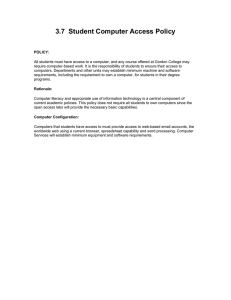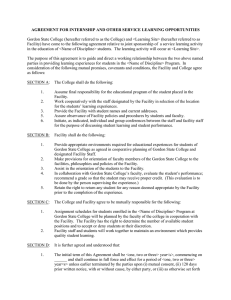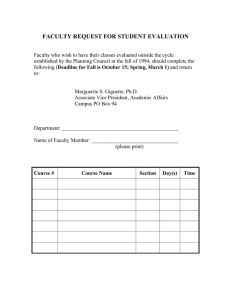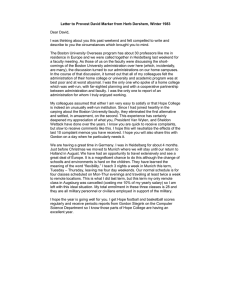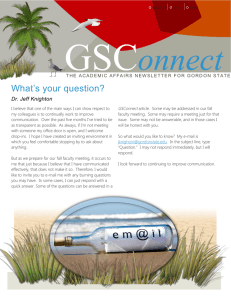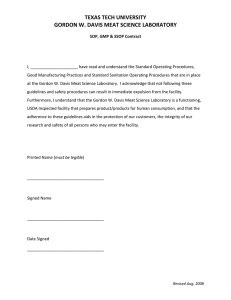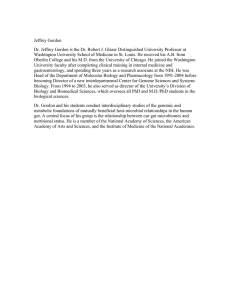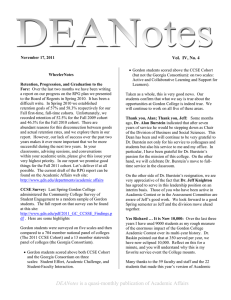students make the connection between their lives and WheelerNotes
advertisement
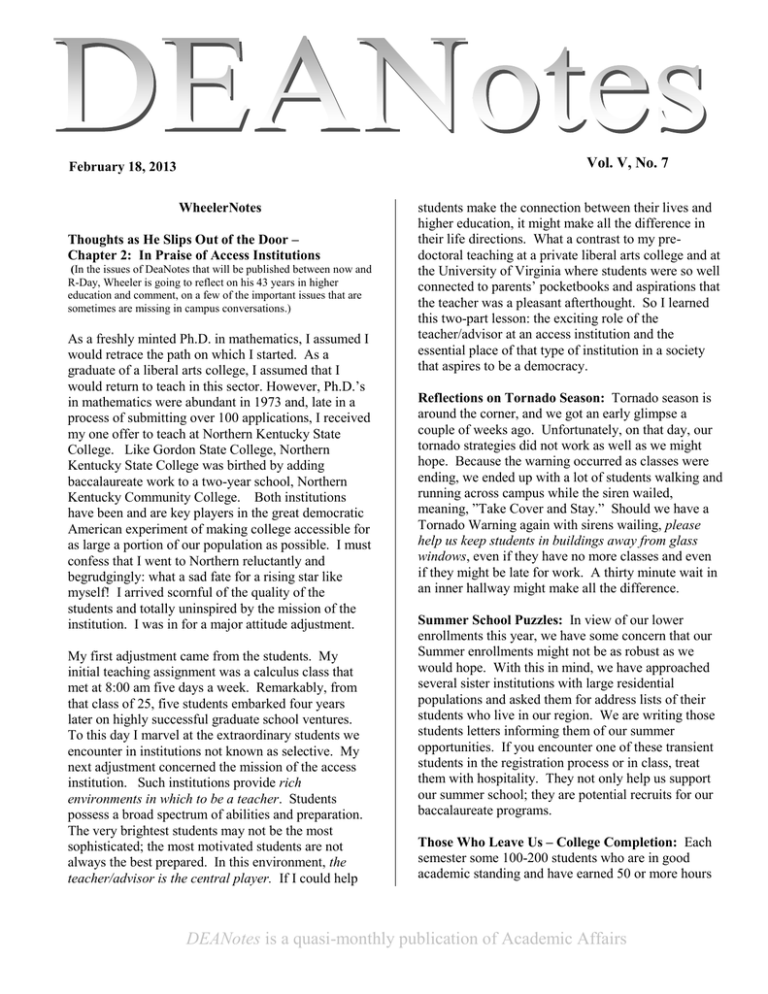
Vol. V, No. 7 February 18, 2013 WheelerNotes Thoughts as He Slips Out of the Door – Chapter 2: In Praise of Access Institutions (In the issues of DeaNotes that will be published between now and R-Day, Wheeler is going to reflect on his 43 years in higher education and comment, on a few of the important issues that are sometimes are missing in campus conversations.) As a freshly minted Ph.D. in mathematics, I assumed I would retrace the path on which I started. As a graduate of a liberal arts college, I assumed that I would return to teach in this sector. However, Ph.D.’s in mathematics were abundant in 1973 and, late in a process of submitting over 100 applications, I received my one offer to teach at Northern Kentucky State College. Like Gordon State College, Northern Kentucky State College was birthed by adding baccalaureate work to a two-year school, Northern Kentucky Community College. Both institutions have been and are key players in the great democratic American experiment of making college accessible for as large a portion of our population as possible. I must confess that I went to Northern reluctantly and begrudgingly: what a sad fate for a rising star like myself! I arrived scornful of the quality of the students and totally uninspired by the mission of the institution. I was in for a major attitude adjustment. My first adjustment came from the students. My initial teaching assignment was a calculus class that met at 8:00 am five days a week. Remarkably, from that class of 25, five students embarked four years later on highly successful graduate school ventures. To this day I marvel at the extraordinary students we encounter in institutions not known as selective. My next adjustment concerned the mission of the access institution. Such institutions provide rich environments in which to be a teacher. Students possess a broad spectrum of abilities and preparation. The very brightest students may not be the most sophisticated; the most motivated students are not always the best prepared. In this environment, the teacher/advisor is the central player. If I could help students make the connection between their lives and higher education, it might make all the difference in their life directions. What a contrast to my predoctoral teaching at a private liberal arts college and at the University of Virginia where students were so well connected to parents’ pocketbooks and aspirations that the teacher was a pleasant afterthought. So I learned this two-part lesson: the exciting role of the teacher/advisor at an access institution and the essential place of that type of institution in a society that aspires to be a democracy. Reflections on Tornado Season: Tornado season is around the corner, and we got an early glimpse a couple of weeks ago. Unfortunately, on that day, our tornado strategies did not work as well as we might hope. Because the warning occurred as classes were ending, we ended up with a lot of students walking and running across campus while the siren wailed, meaning, ”Take Cover and Stay.” Should we have a Tornado Warning again with sirens wailing, please help us keep students in buildings away from glass windows, even if they have no more classes and even if they might be late for work. A thirty minute wait in an inner hallway might make all the difference. Summer School Puzzles: In view of our lower enrollments this year, we have some concern that our Summer enrollments might not be as robust as we would hope. With this in mind, we have approached several sister institutions with large residential populations and asked them for address lists of their students who live in our region. We are writing those students letters informing them of our summer opportunities. If you encounter one of these transient students in the registration process or in class, treat them with hospitality. They not only help us support our summer school; they are potential recruits for our baccalaureate programs. Those Who Leave Us – College Completion: Each semester some 100-200 students who are in good academic standing and have earned 50 or more hours DEANotes is a quasi-monthly publication of Academic Affairs of college credit but have not earned a Gordon degree fail to return to Gordon State College. Some of these students transfer to other institutions, but still others drop out because of illness, personal issues, or work issues. We are in the process of contacting all the students in this category who have left over the past five years reminding them of three things: If you are still out of school, it is time to come back and finish your degree. If you have earned credits at another institution, the credits can be transferred back. In fact, you may have already earned a Gordon two-year degree. If they have received a two-year degree from another institution, we are now in a position to serve them with 8 excellent baccalaureate degrees. If you receive questions from one of these students, please be as accommodating as possible. This program can make real contributions to Complete College Georgia (and, because future budget allocations are tied to graduations, improve our bottom line). 3. When you believe that a student has had adequate chance to correct his or her behavior but has chosen not to do so, you can tell the student to leave the class and that he or she cannot return until the student has met with you outside of class. [If you have a concern about being physically threatened by the student, ask your division chair, school dean, or a colleague to sit in on the meeting.] 4. If the student meets with you, it will be up to you to decide whether the student is serious about changing his or her behavior. You have the option of telling the student that he or she will not be allowed back in your class. 5. Should you not permit the student to return to class, tell the student that you will email your division chair or dean with the details and that the student should make an appointment to talk to the chair. Let the student know that the matter will likely be referred to the Vice President for Academic Affairs and the VP for Student Affairs. A written account from you will be necessary. BaskiNotes Responding to Disruptive Behavior: Dr. Chamberlain, Vice President of Student Affairs, has always been good about letting us know that we can count on him when we have disruptive students in the classroom. In most cases, however, he will not be our first option, but our backup when students have not taken advantage of the opportunity to learn and to correct behavior. A recent incident has prompted me to send the following advice and procedural information regarding disruptive students in your class (copied from a previous DEANotes). 1. Treat the classroom situation, in general, as an opportunity to teach appropriate behavior in a college classroom to those who need it. Make students aware of expected behavior by publishing your expectations in your syllabus and going over the syllabus at the beginning of the semester. 2. If a problem does occur, remind the student of your expectations. If you can address the issue without embarrassing the student, all the better. Responding the first time that a problem occurs, or when you first recognize that there is a problem, helps considerably. 6. If the circumstances of an incident are sufficiently troubling, the incident may be reported directly and immediately to the office of the Vice President of Student Affairs. Call 5056 or email Dawn Byous at dawnb@gdn.edu. If the safety of faculty member or student is in question, call Public Safety’s emergency line, 678-359-5111. In addition, remember that on pages 286 and following of the current catalog you will find the policy you need to support you in your actions. Fall to Spring Retention Rates: Fall-to-spring retention rates are an important indicator for the college, and they are directly related to fall-to-fall retention rates, which we report to the USG. The office of Institutional Research has provided the following promising numbers. All First-time Freshmen First-time Part-time Freshmen First-time Full-time Freshmen Fall 2011 to Spring 2012 81.4% Fall 2012 to Spring 2013 86.9% 64% 77.4% 82.6% 87.5% DEANotes is a quasi-monthly publication of Academic Affairs College Culture Series: the second edition of the President’s Speaker Series will take place on March 20, 2012. Our speakers will be: Andre Kessler, a holocaust survivor who went on to play basketball with the NBA (and thereafter affiliated with the Breman Jewish Heritage Museum). Jane Gunter, a witness to history as a passenger on the bus with Rosa Parks (and who has occasionally partnered with the Rosa and Raymond Parks Institute). Help Get the Word Out! If you are involved in activities that demonstrate Gordon’s worth to the region/community, student success, faculty success— items that grab the interest of potential students and our constituents—I hope you will communicate them to Tamara Boatwright, our Public Information Specialist, at tamarab@gordonstate.edu. A positive public perception of Gordon State College matters to us all! GahrNotes Dr. Amanda Duffus has received a travel award to attend the annual meeting of the Southeastern Partners in Amphibian and Reptile Conservation, where she will be giving portions of two workshops with Drs. Deb Miller and Matt Gray from the University of Tennessee. One of her students will be presenting a poster at the meeting as well. She has also had six student poster presentations accepted for the Georgia Academy of Sciences meeting in March. Additionally, Dr. Duffus had a manuscript accepted for publication in the Herpetological Review. The article will appear in the June 2013 issue. Dr. Richard Schmude, Jr., presented “The Movement of Jupiter’s Great Red Spot” on January 31 as part of the Gordon State College Speaker series. Dr. Schmude also presented “Stellar Spectra” to students at Covenant Heart Academy in Barnesville on February 8, 2013. As the faculty sponsor of the Newman Club, Dr. Schmude arranged for Ash Wednesday services to be held on the Gordon College Campus in IC 208 at 2:00 PM on February. 13. Dr. Greg Hartman was a judge for the Lamar County Middle School Science Fair on January 9. He also served as a judge for the Griffin RESA Science Fair held on February 7. Dr. Linda Hyde also served as a judge for the Griffin RESA Regional Engineering and Science Fair on February 7. In 2011, Dr. Cathy Lee participated in the National Science Foundation (NSF) Advanced Technology Education Genomic Approaches in Biosciences Program evaluation study conducted by the DNA Learning Center (www.dnalc.org) of Cold Spring Harbor Laboratory in New York. The study seeks feedback from bioscience educators who attended the training program, Genomic Approaches in Biosciences, which is designed to help 2-4 year college educators prepare students for careers in biotechnology. In that regard, Dr. Lee and Dr. Clark Danderson are directing the work of six Undergraduate Biology researchers in a DNA Barcoding Project. Dr. Amy Nisselle, manager, multimedia professional, & evaluator for the DNA Learning Center of Cold Spring Harbor Laboratory recently was on the Gordon Campus to evaluate Gordon’s undergraduate researchers’ laboratory competencies. Dr. Theresa Stanley also assisted in the evaluations and contributed greatly to Dr. Nisselle’s visit. Dr. Jennifer Gardner will be presenting a lecture on Thursday, February 21st, at 7pm at the Zebulon, GA Farm Bureau. She is presenting to the Pike County Agricultural Authority and the Pike County Horse Club. The topic is “Current topics in managing intestinal parasitism of equids.” Dr. Cris Fermin-Ennis served as a judge at Spalding County’s Science Fair on January 11. Spencer Hamrick and Dean Wheeler - About two years ago, Dr. Gahr asked Spencer Hamrick to build and teach CSCI 1371 (Computing for Engineers) modeling it after Georgia Tech’s template incorporating MATLAB software. The aim was for the course to be approved for credit not only for local consumption, but also by GATECH for inclusion in our Regents Engineering Transfer Program (RETP) for transfer credit. Meanwhile, also two years ago, Dean Wheeler formally asked GATECH to accept the course for transfer credit. To end the two years of repeated ‘nagging’ by Dean Wheeler, GATECH finally approved the course for transfer credit. Their effort gives a significant boost to our RETP program. GarrettNotes Dr. Anne Purvis and Professor Annette Jackson attended the 2013 Faculty Development Conference of the American Association of Colleges of Nursing in Jacksonville, Florida February 7-9. Topics represented timely, relevant areas of nursing education, and included student engagement, nursing curriculum, connecting classroom and clinical knowledge, instructing online, working with RN-toBSN and graduate students, and more. Dr. Purvis and Mrs. Jackson took advantage of the opportunity to DEANotes is a quasi-monthly publication of Academic Affairs network with nurse educators from across the nation, and are proud to report that the faculty of GSC’s School of Nursing is actively engaged in many of the strategies presented at the conference. or come by the library to schedule a session. These sessions may be tailored for each class. From a community perspective, Professor Samantha Bishop and her nursing student volunteers have been very active by raising 36 units of blood for the American Red Cross Blood drive and performing scoliosis screenings in the Lamar County school system. Additionally, students from Lamar County High School recently visited Gordon State College campus and sat in on a nursing class taught by Professor Bishop. Please access the following link as this event was noted in the local news Dr. Jason Horn, faculty advisor to Phi Theta Kappa, the two-year college honor’s society, reports that Emmitt Pharr, a member of Phi Theta Kappa, has been nominated for the “All Georgia Academic Team.” Along with other nominees from around the Georgia, he will be attending an awards ceremony in Atlanta on March 15. He has been nominated to receive up to a $2000 award. Mr. Pharr has already received a Phi Theta Kappa scholarship while at Gordon for $11,000 to attend Mercer University. WhitelockNotes http://www.barnesville.com/ JansseNotes The next application deadline for the Honors Program is March 1. Please encourage eligible students to apply. Application information and forms can be found here: http://www.gordonstate.edu/admissions/advanced/honor s/index.asp On March 18, the Honors Program will be sponsoring a reading and book signing by our very Larry Weill. He will be reading from his novel Incarnate, which is in the finishing stages of publication. Stay tuned for further details! RutherfordNotes New Titles List- A document containing a list of new titles added to the collection in 2012 has been sent to the Deans and Division Chairs. The new titles list is managed in call number order. Titles purchased and titles donated are included in this list. Ask-a-Librarian--On the Gordon State College GALILEO page the "Ask-a-Librarian" is now functioning. By clicking on this link, one may open and send an email to library support. This email will be answered by a librarian. Library Web Page--The library staff is making a list of changes to make to the library web page. We are open to suggestions. If you have suggestions for the web page, please send them to me. Library Orientations/Workshop—Please remember that the librarians are available for bibliographic instruction or information literacy sessions. You may schedule a session in the library or schedule to have a librarian to come to your class. Please call, email, In February, Dr. Doug Davis sent the finished copy of the text for the special issue of Configurations that he is editing to the publisher; it should see print by month’s end. Dr. Davis will also present his paper, “Flannery O’Connor’s Gothic Science Fiction,” next week at the American Literature Association Symposium on the Gothic in Savannah. He has also just had a paper proposal, “Teaching Flannery O’Connor in the Science and Technology Studies Classroom,” accepted for inclusion in a forthcoming collection from the Modern Language Association Press, Approaches to Teaching the Works of Flannery O’Connor. Dr. Stephen Powers’ poem, “The Great Chicago Earthquake of 2002,” was just published in The Southern Poetry Anthology, Volume 5: Georgia. Dates & Deadlines Feb 22 (F) Campus Visit Day Feb 28 (R) Midterm – Withdrawals after Feb 28 will be an automatic WF except in cases of hardship as documented & approved by processing a Student Petition. Mar 11-15 Spring Break for Faculty and Students Mar 18 College Culture Event Advising: Experienced Advisors 4PM Fnd Room SC 229 Mar 18 Honors Program Sponsored Reading & Book Signing Dr. Larry Weill’s Incarnate Mar 20 (W) Georgia History & U.S. Constitution Exam Mar 20 (W) College Culture Speaker Series: Andre Kessler, A Holocaust Survivor Jane Gunter – “I Rode the Bus with Rosa Parks Location & Time TBA Mar 23 (S) Campus Visit Day Apr 1 – 19 (M-F) Early Registration for Continuing Students for Summer and Fall 2013 Apr 29 (M) Last day of classes Apr 30 thru Final Exams May 3 (T- F) Book Buy-Back – Bookstore May 10 Friday Graduation DEANotes is a quasi-monthly publication of Academic Affairs
